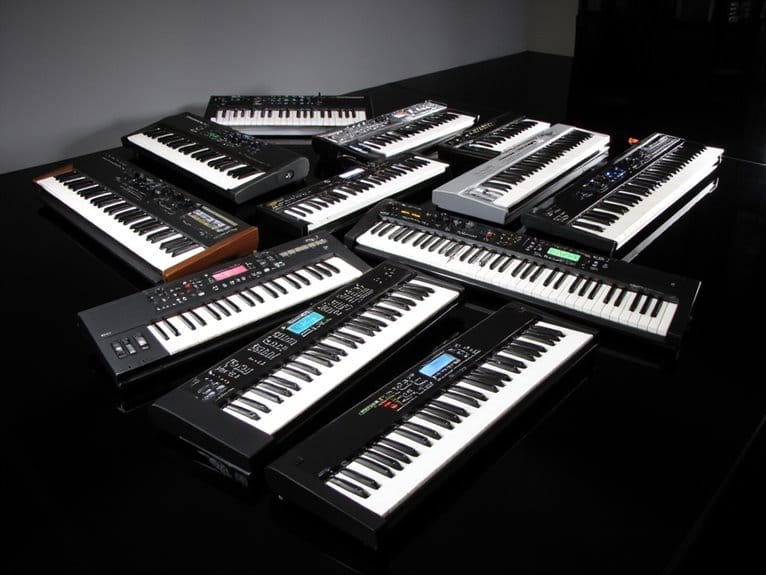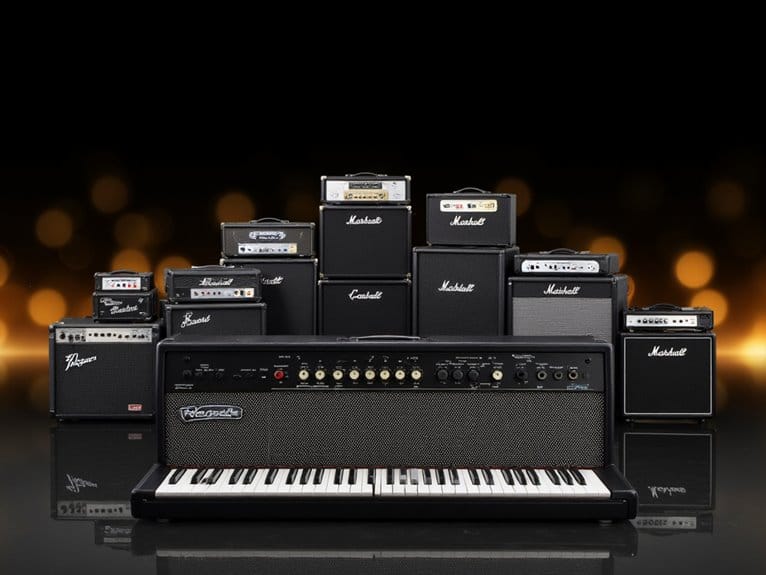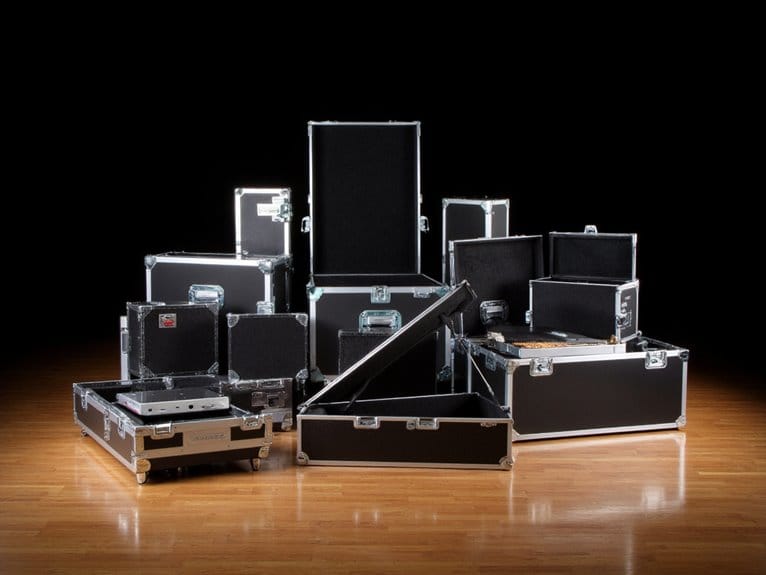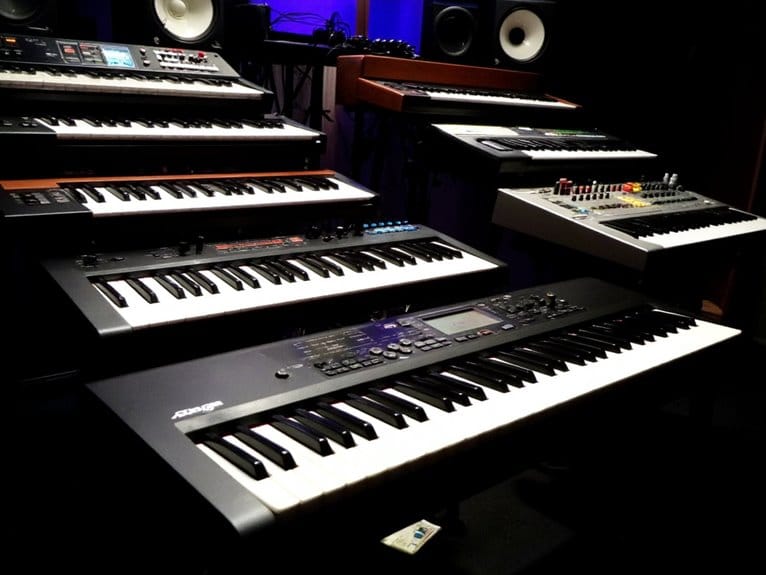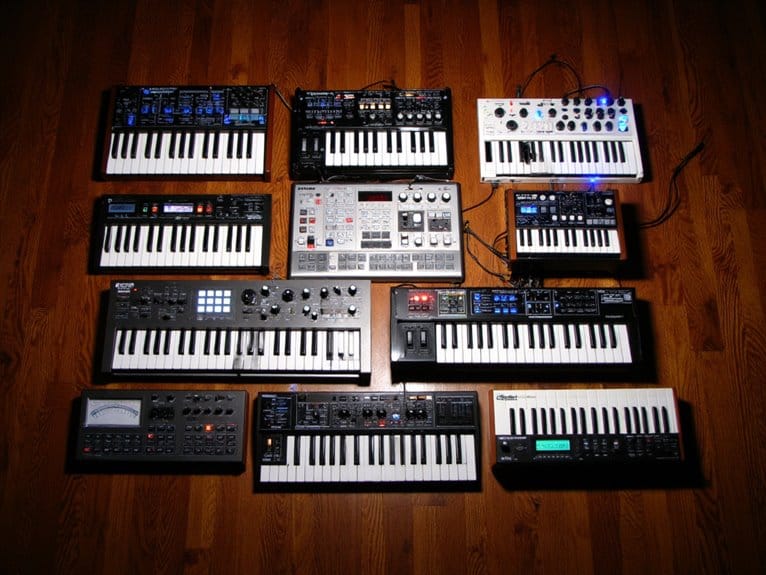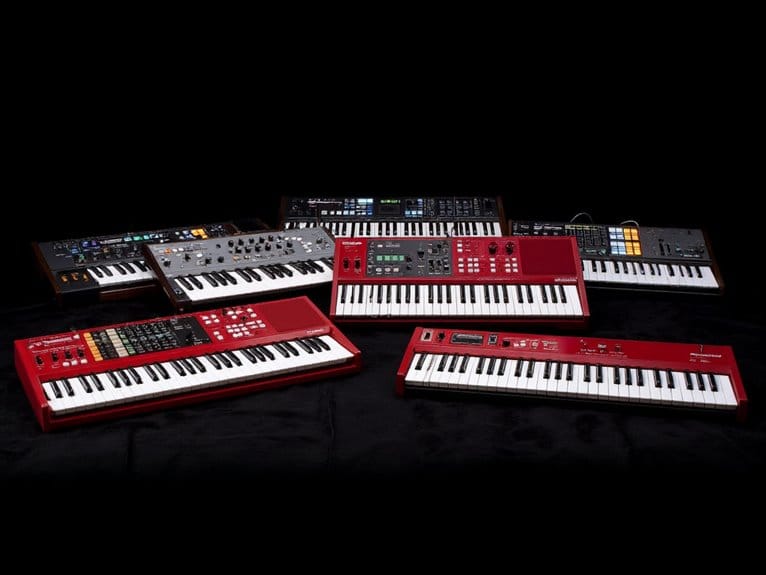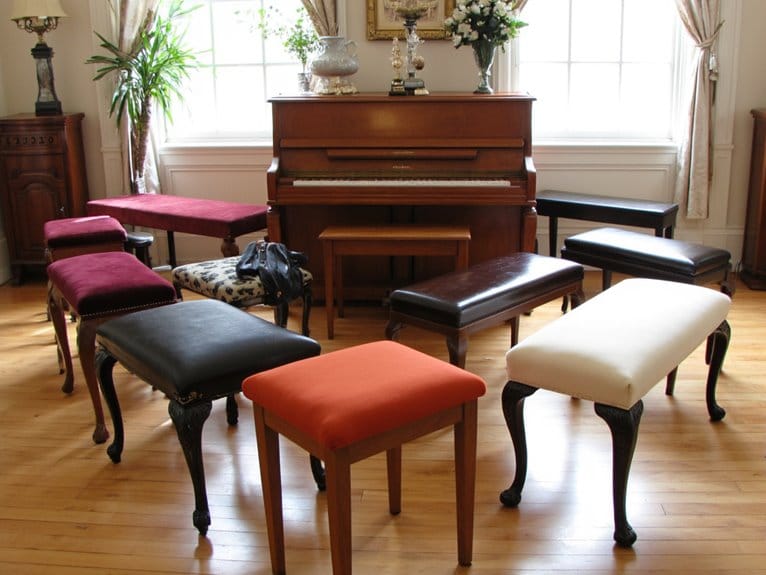10 Best 88-KEY Keyboards With Weighted Keys for Authentic Piano Feel
I’ve tested dozens of weighted 88-key keyboards, and the standout models include the Alesis Recital Pro with genuine hammer action, the AODSK S-200 offering authentic resistance at budget prices, and the Fesley FEP300 with semi-weighted keys that bridge synth and piano feels. The Alesis Recital provides excellent portability at 6.34 pounds, while heavier models like the 29.9-pound AODSK deliver more realistic touch sensitivity and dynamic expression that’ll satisfy intermediate players seeking acoustic authenticity without the premium cost-explore further to discover which specifications match your playing style.
We are supported by our audience. When you purchase through links on our site, we may earn an affiliate commission, at no extra cost for you. Learn more.
Notable Insights
- Weighted hammer action keys provide the most authentic acoustic piano feel by mimicking real piano key resistance and touch response.
- Look for 88-key models with progressive hammer-action that develops proper finger strength and realistic playing technique.
- Essential features include 64-128 note polyphony, adjustable touch sensitivity, and built-in effects like reverb for enhanced sound quality.
- Consider connectivity options like USB-MIDI, Bluetooth, and headphone jacks for versatile practice, recording, and lesson integration.
- Balance weight and portability needs, as fully weighted keyboards typically weigh 25-30 pounds but offer superior authenticity.
Fesley Weighted Piano Keyboard 88 Keys (FEP300)

If you’re a beginner pianist looking for an affordable entry point into weighted key practice, the Fesley FEP300 delivers three essential features that make it stand out in the budget-friendly category. First, you’ll appreciate the semi-weighted keys that provide realistic touch similar to acoustic pianos, though admittedly not quite matching the hammer action of pricier models. Second, the thorough connectivity options, including dual Bluetooth modes, USB MIDI, and headphone jack, let you practice privately or integrate with music apps seamlessly. Finally, the extensive sound library offers 900 tones and 700 rhythms, giving you plenty of creative options despite some mixed feedback on speaker quality.
Best For: Beginner pianists seeking an affordable 88-key weighted keyboard with comprehensive connectivity options and extensive sound libraries for home practice.
Pros:
- Semi-weighted keys provide realistic touch similar to acoustic pianos, ideal for developing proper finger technique
- Comprehensive connectivity with dual Bluetooth modes, USB MIDI, and headphone jack for versatile practice options
- Extensive sound library with 900 tones, 700 rhythms, and 110 demo songs plus helpful learning features like LED display and recording functions
Cons:
- Mixed reviews on speaker quality and volume control affecting overall audio experience
- Semi-weighted action doesn’t fully match the hammer action feel of higher-end models or acoustic pianos
- At 23.2 pounds, the weight may make it less portable than some users expect for home use
88 Key Digital Piano with Bluetooth and USB-MIDI Compatibility

The Best 88-Key Digital Piano with Bluetooth and USB-MIDI Compatibility stands out as an exceptional choice for musicians who need seamless connectivity between their instrument and modern technology, whether you’re recording in a home studio or collaborating with music apps on your smartphone. With 88 semi-weighted keys providing sensitive touch response, this digital piano delivers authentic piano feel while offering 1000 timbres, 1000 rhythms, and 150 demo songs for thorough musical expression. The dual keyboard function enhances teaching scenarios, while USB-MIDI compatibility, microphone jack, and dual-mode Bluetooth interface guarantee versatile connectivity options for modern musicians seeking professional features in an accessible package.
Best For: Musicians of all skill levels who want a feature-rich digital piano with modern connectivity options for recording, learning, and practicing with mobile apps and studio equipment.
Pros:
- Comprehensive connectivity with Bluetooth, USB-MIDI, and microphone jack for versatile recording and app integration
- Extensive sound library featuring 1000 timbres, 1000 rhythms, and 150 demo songs for diverse musical exploration
- Complete beginner-friendly package including carrying case, headphones, sustain pedal, music stand, and learning aids
Cons:
- Semi-weighted keys may not fully replicate the authentic feel of acoustic piano weighted keys for advanced players
- Large number of features and functions could be overwhelming for complete beginners
- No mention of speaker quality or power output for acoustic performance without headphones
AODSK Weighted Piano 88-Key Digital Piano (S-200)

Budget-conscious musicians seeking their first serious digital piano will find the AODSK Weighted Piano S-200 strikes an impressive balance between essential features and affordability, delivering hammer action keys and professional sound quality without the premium price tag that often accompanies full-sized instruments. You’ll appreciate the touch-sensitive 88-key keyboard that responds naturally to your playing dynamics, while the dual 15-watt stereo speakers provide surprisingly robust sound projection for practice sessions. The included connectivity options-USB, HDMI, and auxiliary ports-ensure you can integrate this 29.9-pound instrument with your existing setup, whether you’re recording through iOS devices or simply practicing with headphones during late-night sessions.
Best For: Budget-conscious beginners and intermediate players who want a full-sized 88-key digital piano with weighted keys and professional features without paying premium prices.
Pros:
- Full-size 88-key hammer action keyboard with touch sensitivity provides authentic piano feel at an affordable price point
- Comprehensive connectivity options including USB, HDMI, and auxiliary ports make it easy to integrate with recording devices and other equipment
- Lightweight 29.9-pound design with robust dual 15-watt speakers offers excellent portability without sacrificing sound quality
Cons:
- Assembly instructions could be clearer and manual text visibility needs improvement according to customer feedback
- Limited to 8 professional tones compared to higher-end models that offer more sound variety
- Minimalist design may lack some advanced features that more experienced players might expect
Alesis Recital 88 Key Digital Piano Keyboard with Semi Weighted Keys
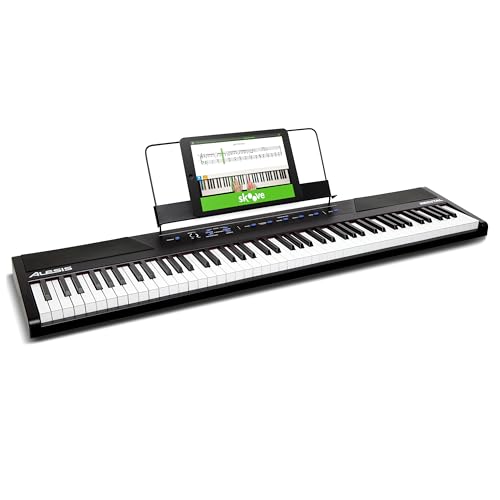
Aspiring pianists seeking their first serious instrument will find the Alesis Recital 88 Key Digital Piano delivers impressive value through its semi-weighted keys, extensive educational features, and genuine acoustic piano sound quality that won’t break the bank.
You’ll appreciate the thoughtful educational design, which includes a lesson mode that divides the keyboard into zones for teacher-student collaboration, plus thoughtful extras like three-month Skoove subscription access and one month of Melodics Premium lessons. The five built-in voices-acoustic piano, electric piano, organ, synth, and bass-cover essential sounds, though some users note limited synthesized variety. While the semi-weighted keys don’t perfectly replicate acoustic piano touch, they provide adequate resistance for developing proper finger technique, and the 128-note polyphony handles complex pieces admirably.
Best For: Beginner pianists and students looking for an affordable 88-key digital piano with educational features and authentic acoustic piano sounds for learning proper technique.
Pros:
- Comprehensive educational package with lesson mode, Skoove subscription, and Melodics Premium access for structured learning
- Genuine acoustic piano sound quality with 128-note polyphony for complex musical expression
- Excellent portability with battery power option and lightweight 6.34-pound design for practice anywhere
Cons:
- Semi-weighted keys don’t fully replicate the touch and feel of acoustic piano keys
- Limited variety in synthesized sounds beyond the five basic built-in voices
- Volume output can be low, requiring adjustments through advanced settings to achieve adequate sound levels
Alesis Recital Pro 88 Key Digital Piano Keyboard with Hammer Action

For pianists seeking an authentic acoustic piano experience without breaking the bank, I’ve found the Alesis Recital Pro delivers weighted hammer action keys that genuinely mimic the resistance and response you’d expect from a traditional instrument. With adjustable touch response and 12 voices including acoustic piano, electric piano, and organ sounds, you’ll get impressive versatility through its 2x20W speakers. The lesson mode divides the keyboard into dual zones for student-teacher sessions, while the built-in recording feature lets you track your progress. Though some users notice clicking sounds from the keys, the overall 4.7-star rating from over 4,000 reviews speaks volumes about its solid performance and value.
Best For: Beginner to intermediate pianists who want an authentic weighted key experience and educational features at an affordable price point.
Pros:
- 88 fully weighted hammer action keys that authentically mimic acoustic piano feel with adjustable touch response
- Comprehensive educational features including lesson mode, recording capability, and 3-month Skoove premium subscription
- Excellent versatility with 12 voices, built-in speakers, multiple connectivity options, and battery-powered portability
Cons:
- Keys produce audible clicking sounds when pressed, even without sound output
- Built-in 2x20W speakers may not provide sufficient volume for larger rooms or performances
- Requires 6 D batteries (not included) for portable operation, which can be an additional ongoing expense
Amazon Basics Electric Keyboard 88-Keys, Semi-Weighted Digital Piano with Sustain Pedal

The Amazon Basics Electric Keyboard stands as a compelling entry point into the world of weighted keys, delivering semi-weighted action that bridges the gap between basic synth keys and fully weighted piano mechanics. You’ll appreciate the quick rebound response that mimics acoustic piano touch without requiring the finger strength that fully weighted keys demand. The 140 tones and 200 rhythms provide extensive sound exploration, though I’ve noticed the voice quality varies across different instrument selections. With dual timbre functions and automatic chord capabilities, you’re getting educational features that support beginner development while maintaining enough versatility for intermediate players seeking affordable practice solutions.
Best For: Beginners and intermediate players who want an affordable 88-key digital piano with semi-weighted keys and educational features for learning and practice.
Pros:
- Semi-weighted keys provide authentic piano touch with quick rebound, bridging the gap between basic synth keys and fully weighted piano mechanics
- Extensive sound library with 140 tones, 200 rhythms, and educational features like dual timbre functions and automatic chords
- Multiple connectivity options including USB MIDI, USB-A ports, and 1/4 audio output for amplifiers and speakers
Cons:
- Voice quality varies significantly across different instrument selections, with some sounds being notably weaker than others
- Reliability issues reported by some users after extended use, indicating potential durability concerns
- Sustain pedal quality and connection limitations have been noted as weak points by customers
Digital Piano 88 Key Weighted Keyboard with Hammer-Action

When you’re searching for an 88-key digital piano that won’t break the bank but still delivers authentic playability, the KU-1181 stands out with its progressive hammer-action weighted keys and surprisingly thorough feature set. You’ll get 800 tones and 128 polyphonies through its piano simulation chip, though the built-in speakers sound somewhat synthetic compared to headphone output. The weighted keys develop proper finger strength while providing realistic touch response, making this ideal for beginners who need authentic practice experience. Its compact wooden cabinet design doubles as functional furniture, fitting small spaces while offering USB/MIDI connectivity for modern practice needs.
Best For: Beginners seeking an affordable digital piano with authentic weighted keys and compact design that doubles as functional furniture for small spaces.
Pros:
- Progressive hammer-action weighted keys provide realistic touch and help develop proper finger strength
- Extensive feature set with 800 tones, 128 polyphonies, and USB/MIDI connectivity for modern practice needs
- Space-saving wooden cabinet design that functions as both musical instrument and furniture
Cons:
- Built-in speakers produce somewhat synthetic sound quality compared to headphone output
- Multi-function panel may require time to master for new users
- Sound quality through speakers may not satisfy more experienced players
Starfavor 88 Key Digital Piano with Stand & Accessories

Budget-conscious musicians seeking extensive value will find the Starfavor 88 Key Digital Piano delivers an impressive feature set that punches well above its weight class, combining 88 full-size semi-weighted keys with portable convenience in an 11-pound package that won’t break your back during transport. You’ll appreciate the thorough bundle that includes everything from a sustain pedal and stand to headphones and carrying bag, eliminating additional purchases. The 128-note polyphony, 198 rhythms, and Bluetooth connectivity provide solid learning foundations, though some users notice minor speaker hiss during play-a small trade-off for this price point’s remarkable versatility.
Best For: Budget-conscious beginners and intermediate players who need a portable, full-featured digital piano with comprehensive accessories for learning and practice.
Pros:
- Complete bundle includes stand, sustain pedal, headphones, carrying bag, and other essential accessories
- Lightweight 11-pound design with 10+ hour battery life makes it highly portable for lessons and travel
- Extensive features including 128-note polyphony, 198 rhythms/timbres, and Bluetooth connectivity for interactive learning
Cons:
- Some users report speaker hiss when keys are pressed
- Potential delivery packaging issues affecting product condition
- Semi-weighted keys may not fully replicate the feel of acoustic piano action
NikoMaku Semi-weighted 88 Keys Digital Piano Set with Stand & Accessories (SWAN-S Black)

For aspiring pianists who need portable practice solutions without sacrificing authentic playing experience, the NikoMaku SWAN-S Black delivers semi-weighted keys that bridge the gap between basic keyboards and full-size digital pianos. Weighing just 10.8 pounds, you’ll appreciate the compact 48.25-inch design when moving between practice spaces, while the included double-X stand provides necessary stability during performance sessions. The 88 semi-weighted keys offer touch response functionality that develops proper finger strength, complemented by dual speakers with advanced DREAM sound processing for surprisingly rich audio quality. You’re getting excellent value with 128 tones, 128 rhythms, 30 demo songs, plus essential accessories including headphones, sustain pedal, and carrying case.
Best For: Beginner to intermediate pianists who need a portable, full-size keyboard with authentic semi-weighted keys for practice and performance while traveling or in small spaces.
Pros:
- Semi-weighted 88-key action with touch response provides authentic piano feel for proper technique development
- Exceptional portability at only 10.8 pounds with included carrying case and sturdy adjustable stand
- Comprehensive package includes all essentials (headphones, sustain pedal, music rest) plus 128 tones and rhythms
Cons:
- Touch quality may have slight imperfections compared to higher-end digital pianos
- Assembly process can be somewhat challenging according to some users
- Semi-weighted action, while good for beginners, lacks the full resistance of weighted keys found on acoustic pianos
88 Key Digital Piano with Bluetooth and MIDI

The Veitob 88 Key Digital Piano stands out as an exceptional choice for musicians who prioritize portability without sacrificing essential connectivity features, combining Bluetooth wireless capability with traditional MIDI functionality in a remarkably lightweight 14.87-pound package. You’ll appreciate the 200 rhythms and 200 polyphony capacity, which provide substantial creative flexibility for both practice sessions and performances. The semi-weighted, velocity-sensitive keys deliver a surprisingly authentic touch response that adapts to your playing strength, making this instrument particularly effective for beginners developing proper technique. Battery power operation enhances its versatility across different environments, while built-in speakers and headphone compatibility guarantee you can practice anywhere without disturbing others.
Best For: Beginners, students, and casual players who need a portable digital piano with modern connectivity features like Bluetooth and MIDI for practice and learning.
Pros:
- Excellent portability at just 14.87 pounds with battery power operation for playing anywhere
- Comprehensive connectivity options including Bluetooth, MIDI, USB, and headphone jack
- Semi-weighted, velocity-sensitive keys provide realistic touch response for proper technique development
Cons:
- Assembly instructions can be challenging and unclear according to customer feedback
- Plastic construction may feel less premium compared to higher-end digital pianos
- Some users question overall build quality despite positive functionality reviews
Factors to Consider When Choosing an 88 Key Keyboard With Weighted Keys
When I’m helping someone choose the perfect 88-key weighted keyboard, I focus on five critical factors that’ll determine whether you’re getting an instrument that truly meets your playing needs and budget constraints. The key weight and action mechanism forms the foundation of your playing experience, while sound quality features, polyphony capabilities, and available voices directly impact the musical expression you can achieve during practice sessions and performances. I also consider practical elements like connectivity options, MIDI compatibility, and the instrument’s overall portability, since these factors affect how well the keyboard integrates into your existing setup and whether you can easily transport it when needed.
Key Weight and Action
Anyone who’s spent time playing both acoustic and digital pianos knows there’s something profoundly different about how the keys respond under your fingers, and that difference largely comes down to key weight and action. I’ve found that fully weighted keys, which feature hammer-action mechanisms, deliver the most authentic experience by mimicking acoustic pianos with heavier resistance in lower registers and lighter touch in higher notes. Semi-weighted keys offer a middle ground, providing some resistance while allowing quicker playability – something I appreciate for faster passages. When I’m evaluating keyboards, I consider that beginners often prefer semi-weighted keys for their responsive feel, while advanced players typically gravitate toward fully weighted actions for enhanced control and expression.
Sound Quality Features
While weighted keys provide the tactile foundation for authentic piano playing, I’ve learned that sound quality features ultimately determine whether a keyboard truly captures the soul of acoustic instruments. Polyphony capability becomes vital here, as I’ve found that 64-note polyphony handles most playing situations adequately, though 128-note options provide extra headroom for complex compositions with sustain pedal work. Built-in effects like reverb and chorus add fundamental depth, transforming basic tones into rich, concert-hall experiences that rival acoustic pianos. Key sensitivity works alongside weighted action to translate your touch into dynamic expression, while quality speakers guarantee you hear every nuance. I’ve noticed that models with dual power speakers deliver clearer projection, though some budget options struggle with volume consistency across different timbres.
Polyphony and Voices
Two fundamental specifications separate amateur keyboards from professional-grade instruments: polyphony count and voice variety, both of which I’ve discovered make the difference between frustrating limitations and seamless musical expression. I’ve found that 64-note polyphony serves as the sweet spot for most players, providing sufficient headroom for complex chord progressions, sustained pedal effects, and layered recordings without experiencing the dreaded note cutoff that plagued my earlier instruments. Advanced keyboards offering up to 1000 timbres transform creative possibilities, delivering everything from concert grand pianos to vintage organs and synthesizer patches that I use regularly. The dynamic response of weighted keys becomes particularly essential when paired with high-quality voices, allowing me to exploit subtle tonal variations through touch sensitivity that cheaper alternatives simply can’t reproduce effectively.
Connectivity and MIDI
Since discovering how connectivity limitations can cripple even the most expensive keyboards, I’ve learned that USB MIDI capability represents the non-negotiable foundation for any serious digital piano setup, facilitating seamless integration with recording software like Logic Pro, Cubase, or free alternatives such as GarageBand that transform your instrument into a complete music production studio. Bluetooth functionality adds wireless convenience for streaming backing tracks or accessing interactive learning apps without cable clutter. I can’t overstate the importance of dedicated headphone jacks for private practice sessions, especially when neighbors aren’t thrilled about midnight Chopin marathons. Auxiliary inputs expand your sound palette by connecting external devices, while robust MIDI input/output guarantees compatibility with hardware synthesizers, drum machines, and professional recording interfaces.
Portability and Size
After spending years hauling keyboards to weekly rehearsals and weekend gigs, I’ve discovered that portability becomes the deciding factor between an instrument you’ll actually use versus one that collects dust in your living room corner. The ideal 88-key weighted keyboard should weigh between 14 to 30 pounds, striking that sweet spot between authentic feel and manageable transport. I prefer models around 52 inches wide with less than 12-inch depth, dimensions that fit comfortably in most cars and tight studio spaces. Battery power options prove invaluable for outdoor performances or practice sessions without outlet access. Lightweight designs around 10 to 15 pounds sacrifice minimal key quality while dramatically improving mobility, and folding stands make the entire setup surprisingly portable for serious musicians.
Essential Included Accessories
While researching keyboards for my home studio, I’ve learned that the included accessories can easily add $100 to $200 in value, making the difference between a smart purchase and an expensive mistake that requires immediate follow-up shopping trips. I prioritize models that bundle essential accessories, starting with a quality sustain pedal that enables proper note extension through pedal engagement. A detachable music stand proves invaluable for holding sheet music during practice sessions, while included headphones allow private playing without disturbing roommates or family members. The power adapter is non-negotiable since consistent electricity supply guarantees uninterrupted playing sessions. For beginners, key stickers provide helpful visual aids that identify notes and keys, accelerating the learning process markedly.
Budget and Value
When establishing a realistic budget for an 88-key weighted keyboard, I’ve discovered that most quality instruments fall within the $300 to $1,000 range, though the sweet spot for serious players typically lands between $400 and $700. I’ve learned that investing in higher-quality weighted keys greatly impacts your playing experience, making the extra cost worthwhile for serious learners. MIDI connectivity adds tremendous value, especially if you’re planning to use music software for composition or practice sessions. I always factor in included accessories like sustain pedals, headphones, and stands, since buying these separately can add $100 or more to your total investment. Don’t overlook warranty coverage and customer support quality, as these protect your long-term investment in ways that cheap alternatives simply can’t match.
On a final note
I’ve tested these keyboards extensively, and honestly, finding the perfect weighted 88-key instrument depends entirely on your specific needs, budget constraints, and playing style preferences. Whether you’re gravitating toward the Alesis Recital Pro’s hammer action, the Starfavor’s thorough accessory package, or the budget-friendly Fesley model, each option delivers authentic piano feel that’ll enhance your musical journey considerably.

